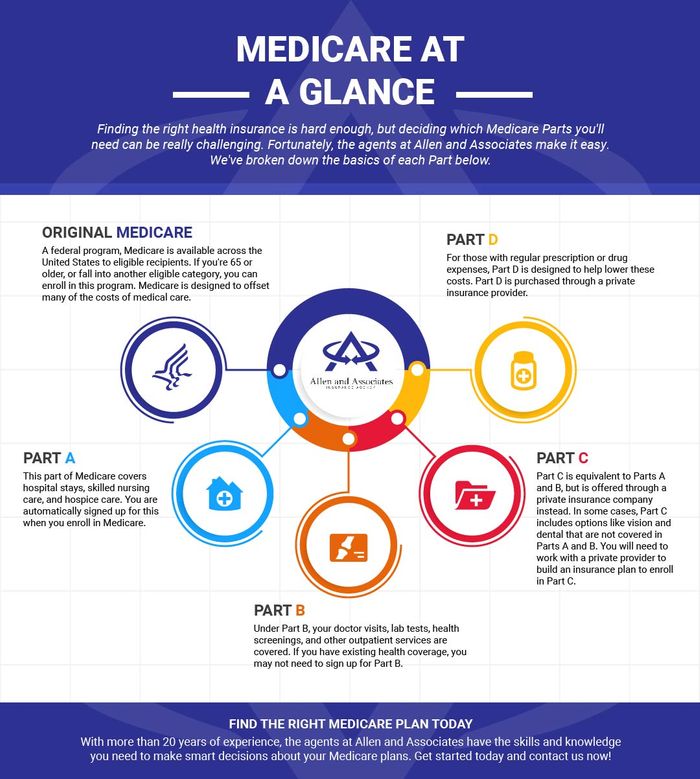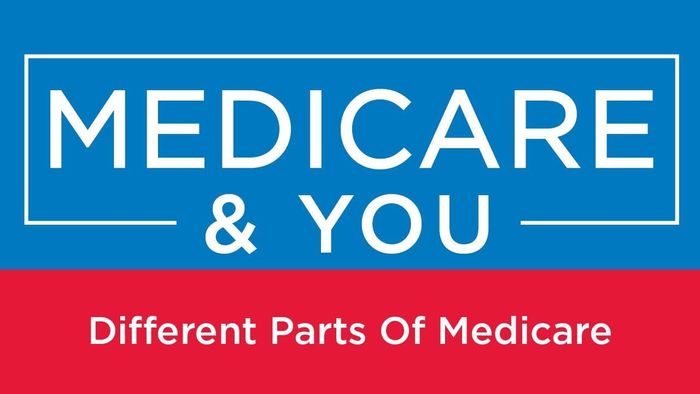Contact Us to Get Started
Choosing the Right Medicare Plan is Easier Than You Think
Whether you’ve aged into Medicare, or are eligible for other reasons, determining which plan and level of coverage you need can be vexing at best, indecipherable at worst. But just because choosing the right Medicare plan can be challenging doesn’t mean you should forgo getting the right coverage for your needs.
Fortunately, the friendly and knowledgeable Medicare insurance agents at Allen and Associates are here to help. We’re dedicated to providing expert education on the benefits you need to live your best quality of life. If you’re struggling to find the right Medicare plan for your needs, start with this useful resource, then reach out to the agents at Allen and Associates.
See Why Allen and Associates is a Top Rated National® Insurance Agency
- Our agents can be found across the United States, working in more than 15 states.
- Our work specializes in Medicare benefits and is designed to educate and empower beneficiaries.
- Each of our agents is trained to carefully walk you through all of the Medicare benefits and policies to help you select the right program.
- We’re ready to help you find the right plan for your needs, and can connect you with federal and private programs that make the most sense.
- With more than two decades of experience, we know the ins and outs of the Medicare program better than anyone.
Medical insurance on its own is complicated enough, but when you try and decipher a federal program like Medicare, it’s easy to get intimidated. Working with a Medicare insurance agent is a great way to make picking out a plan faster, more affordable, and easier.
Are You Eligible for Medicare?
If you’re 65 or over, suffer from a disability, or have End-Stage Renal Disease, you are eligible for Medicare. There are two parts to original medicare, A and B. You can sign up for Part A if you’re 65 or older or if you and your spouse paid Medicare taxes for at least 10 years. Additionally, if you have qualified for 24 months of Social Security benefits, you are also eligible for Medicare.
An easy way to determine if you’re eligible for a Medicare insurance plan is to use this handy calculator from the official Medicare site. It provides you an estimate as to when you’re eligible for Medicare and your premium amount.

Things to Consider When Enrolling in Medicare
For many, enrolling in Medicare when they’re eligible is an obvious choice. For those with existing medical insurance plans, that choice might be a little more complicated. When considering which Medicare plan is right for you, here are a few things to keep in mind:
- Cost - Premiums, deductibles, and other medical expenses can add up quickly. Work with your insurance agent to understand the coverage rules that dictate your costs.
- Coverage - Are you enrolled in the Medicare plans that best meet your medical needs?
- Other coverage options - If you’re enrolled in other medical coverage plans, make sure they’re supplement or pair with Medicare and do not negate any benefits.
- Prescription drugs - If you already have a prescription drug plan, make sure you’re not paying any penalties by joining Medicare. Similarly, make sure you understand any rules that apply to your prescriptions.
- Choice of hospitals and doctors - Do your preferred healthcare center and provider accept Medicare? Will you need referrals to see specialists who accept Medicare?
- The quality of care - Will your quality and type of care change when you switch to Medicare?
- Travel - If you travel often, Medicare may not cover you. You will need to look into supplemental insurance policies.
DO YOU KNOW WHICH MEDICARE PLAN IS RIGHT FOR YOU?
Like private insurance policies, Medicare has distinct parts that you can opt into and pay for, and others that are essential to have a Medicare plan. Here’s a brief overview of each part.

ORIGINAL MEDICARE
Original Medicare is a fee-for-service type plan that allows you to go to any healthcare provider that accepts Medicare. With this level of coverage, you’ll be able to work with any doctor or hospital that accepts Medicare. You’ll find healthcare providers across the United States who accept original Medicare. After using any medical services, Medicare will pay its portion of any of the services you use, and you’ll cover the rest out-of-pocket. Generally, you’ll find that original Medicare covers most, but not all, of your medical expenses.
If you sign up for Part A and B and Social Security, you’ll be enrolled in Original Medicare automatically.

Part A
You are automatically signed up for Part A when you enroll in Medicare. Medicare Part A covers hospital stays and care during hospitalization. Part A covers things like skilled nursing care, medical events that require rehabilitation, or stays in a specialty facility.
Generally, people don’t pay for any premiums when enrolled in Part A. This is because they’ve paid into these costs through tax deductions on paychecks during their working years. However, Medicare does assess you a deductible when you’re admitted to a healthcare facility. The cost of this deductible shifts from year-to-year. To help cover these costs, you can enroll in something like a Medigap policy. When you stay in a hospital, Medicare will cover basically all of the services for the first 60 days. It’s important to note that you may have to buy into Part A if you have not worked enough to qualify for Medicare. This applies to both U.S. citizens and permanent residents.

Part B
Medicare Part B covers trips to the doctor, lab tests, screenings, and outpatient services.
If you’re still working, have an existing health care plan, or are on a family member’s insurance plan, you may not want to sign up for Part B, as Part B involves more costs than Part A. That said, if you don’t have another insurance plan, and you don’t sign up for Part B when you first enroll in Medicare, you may have to pay higher premiums. Additionally, you’ll be assessed an annual deductible that changes from year-to-year. Similarly, you’ll be expected to pay for 20 percent of all of your bills for healthcare visits and outpatient services. These fees will be collected from your Social Security if you’re collecting monthly benefits.

Part C
Also called Medicare Advantage, Part C is offered through private insurance companies and offers plans that are equivalent to Part A, B, and in some cases, include coverage from Part D. You’ll still have to enroll in Parts A and B and pay any premiums associated with B, but you’ll sign with a private insurance company.The plans offered by private groups have to offer the same level of coverage as the federally offered original Medicare program, and in many cases, offer additional coverage options like vision and dental. In many cases, Medicare Advantage plans also include things like prescription drug costs.
Generally, Medicare Advantage plans are offered as a health maintenance organization (an HMO) or as a preferred provider organization (PPO). Using an HMO, you’ll select your primary care provider who helps you structure care treatments and programs and connects you with referrals. Using a PPO, you’ll be provided with a list of care providers and healthcare facilities that you can select from without needing a referral. In both cases, you’ll pay premiums for seeing providers outside of your network.

Part D
Medicare Part D helps pay for your prescription drugs and can be purchased through a private insurer. Depending on which provider you purchase Part D through, you can expect premiums and out-of-pocket costs in the form of copays, a percentage of the drug cost, or as an annual deductible.
If you have high prescription drug costs, you may encounter the medicare coverage gap. Basically, once your drug plan has hit a set expense for your prescriptions, you won’t pay more than 25 percent of the costs for brand-name drugs and 37 percent of the cost for generics. If your drug costs continue to mount, you could qualify for catastrophic coverage, which means you’ll be responsible for five percent of the drug costs.
SO WHICH LEVEL OF COVERAGE IS RIGHT FOR YOU?
The best way to determine this is to work with a Medicare insurance agent. Together, you’ll examine your current healthcare needs, current and expected costs, and other lifestyle factors. You might find that some parts of the Medicare program are well-suited for your needs, while others don’t offer enough. In these cases, you’ll need to find a supplemental insurance policy to take care of any gaps in coverage.
What About Medicare Enrollment Periods?
Enrolling in Medicare can only be done during certain periods of time. Here are the most important enrollment periods for you to keep in mind.

The Initial Enrollment Period
Once you turn 65, you’re able to enroll in Medicare. There’s a seven month window in which you can do this. This includes the three months before the month you turn 65 and the three months after.
For instance, if you turn 65 in July, you can begin to sign up for Medicare starting in April, and can no longer sign up starting in October.
The Medicare Supplement Enrollment Period
If your current Medicare plan doesn’t fully cover your costs, a supplemental plan could help. You can enroll in a supplement plan during a six month period, starting on the first day of the month you turn 65 as long as you’re on Part B.
For example, if you turn 65 on July 15, you have six months from July 1 to sign up for a supplemental plan.
The General Enrollment Period
If you did not sign up for Medicare when you were first eligible or you aren’t eligible for special enrollment, you can sign up for Medicare Part A and B between January 1 and March 31 of each year. Your coverage will start on July 1.

The Special Enrollment Period
In select cases, you may be eligible to enroll in Medicare. These cases include moving out of your existing plan’s service area, or if you’re losing your current medical health coverage. You will be able to join, move to, or opt-out of a Medicare Advantage (Part C) plan in these cases. Your coverage will begin the first day of the month after you enroll.
The Medicare Advantage Open Enrollment Period
From January 1 to March 31 of every year, you can enroll in a MA plan, or move to original Medicare. Your coverage will start on the first day of the month after you enroll. Medicare Advantage plans are purchased through a private insurance company.
The Annual Enrollment Period
If you want to make changes to your existing Medicare plan or enroll in a new one, you have from October 15 to December 7 each year to make these choices. During this period, you can switch from original Medicare to Medicare Advantage or vice versa. You can switch from a MA plan to one without drug coverage, or you can join or opt-out of a Medicare drug plan. You can also update your plan by switching insurers.
Your new coverage will begin on January 1 of the next year.
WHY WORK WITH A MEDICARE INSURANCE AGENT?
Given that Medicare is a federally run program, many believe that they can enroll in Medicare on their own. While many people have done this successfully (there are more than 60 million Americans in Medicare after all), there’s a good chance that they didn’t get the right level of coverage for their needs or missed out on parts that could have benefited them sooner.
Working with a Medicare insurance agent is the easiest way to build a customized Medicare plan that meets your current needs and predicts your future needs, all while saving you money. Here’s why it’s to your benefit to work with our Medicare insurance agents.
Get a Better Understanding of Your Choices
No two people have the same healthcare needs, so it only makes sense that they would need a unique Medicare plan. But finding the right Parts for your needs can be challenging on your own. Even if you know you’re eligible for Parts A and B, you might not recognize that you need something like a Medigap policy at first. Working with a Medicare insurance agent means you’ll be connected with all of the knowledge and resources you need to successfully build a comprehensive Medicare plan.
Our agents will walk you through your current options, explore additional and supplemental plans that you might benefit from, and also help you navigate any potential scenarios you might encounter as you use your Medicare benefits. For instance, if you’re drawing closer to retirement age or are transitioning out of an existing insurance plan, your healthcare coverage options might be different. Our agents draw from their years of experience and knowledge to help you make the right choices.
Learn More About Options in Your Area
While Medicare may be a national program, a Medicare insurance agent can help connect you to local resources that add to or supplement your federal coverage. This means you get more out of your Medicare coverage and are closer to valuable resources.
You’ll Save Time and Money
We all work hard to earn our money and want to make it last, so it only makes sense that we want to get the right Medicare coverage at the right price. A Medicare insurance agent can help you streamline your selection process and make smart, cost-effective choices faster.
On your own, you might review, compare, and peruse options for months on end without making a decision. You could run the risk of missing an enrollment period during this time-consuming process. Rather than trying to decipher which plan means what, you can work with a Medicare insurance agent. Their in-depth knowledge of the Medicare program helps you make a decision quickly. After picking the right parts, they’ll connect you with any private providers you might need for supplemental plans and policies. This keeps you from spending hours navigating individual insurance plans.
Whether you’re on a limited budget for health insurance, or you’re just trying to spend less and get more, an agent is the best way to do just that. It’s hard to compare pricing based on which Parts you’re eligible for, and then line them up next to private insurance options. Often, the pricing structures don’t easily compare. A Medicare insurance agent can help you understand the costs associated with each part and find private insurance options that are a better option for the money.
You’ll Know if You Need Medigap
In some cases, you might need a supplementary insurance policy in addition to your choice of Medicare plan. This supplemental insurance policy is called Medigap. Essentially, this plan pays some or all of the costs that your Medicare plan doesn’t already cover. In some cases, the costs that Medicare does not cover can be exorbitant, especially if you need to receive long-term medical care. Without a Medigap policy, you’ll be left with a bill.
The insurance agents at Allen and Associates can help you determine whether you need a Medigap policy from a private insurance company and when you should purchase it as well.
You’ll Rest Easy Knowing You Got the Plan That’s Best for You
You can’t put a price on peace of mind, but we all know that it’s invaluable. Choosing the right Medicare plan can be stressful if you’re doing it on your own. Rather than feeling overwhelmed by choices, decisions, and second-guessing your decisions, you can trust your Medicare insurance agent to help you make the smartest choice for you. Your plan will be tailored to your needs, your budget, and your future.





